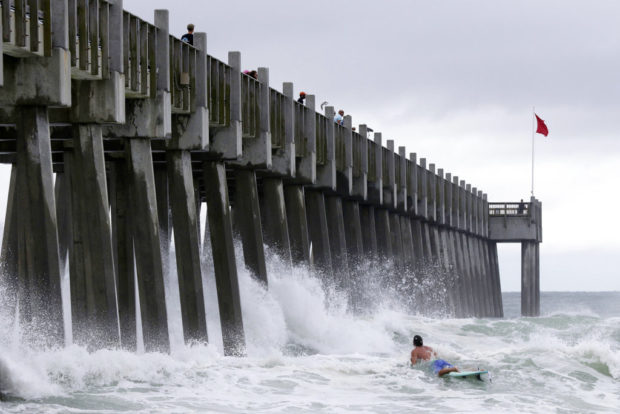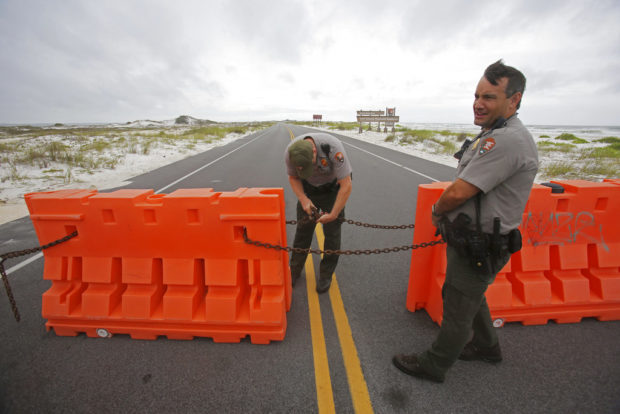‘Alberto’ strikes Gulf Coast with dangerous surf, heavy rain

A surfer makes his way out into the water as subtropical storm “Alberto” approaches on Monday, May 28, 2018, in Pensacola, Fla. The storm gained the early jump on the 2018 hurricane season as it headed toward anticipated landfall sometime Monday on the northern Gulf Coast, where white sandy beaches emptied of their usual Memorial Day crowds. (AP Photo/Dan Anderson)
Subtropical storm “Alberto” lumbered ashore on Monday on the United States Gulf Coast, pelting white sand beaches with blustery winds and stinging rain that kept the usual Memorial Day crowds away.
Forecasters warned heavy rain, flash flooding, and dangerous surf posed the biggest threats as Alberto’s ragged core made landfall near Laguna Beach in the Florida Panhandle. A few brief tornadoes also were possible in much of Florida and parts of Georgia, South Carolina, and Alabama.
The National Hurricane Center in Miami said at 5 p.m. EDT Monday that Alberto was centered about 24 kilometers (15 miles) west-northwest of Panama City, Florida. With maximum sustained winds of 72 kph (45 mph), Alberto was moving north at 14 kph (9 mph).
Rough conditions were whipping up big waves off the eastern and northern Gulf Coast, and authorities warned swimmers to stay out of the surf because of life-threatening swells and rip currents.
Between four and eight inches (10-25 centimeters) of rain could pummel Florida Panhandle, eastern and central Alabama, and western Georgia before the storm moves on. Isolated deluges of 12 inches (30 centimeters) also were possible as the storm heads inland, threatening heavy rains around the Southeast in the coming hours and days.
Article continues after this advertisementAs Alberto’s center heads inland – deprived of the warm waters that fuel tropical weather systems – the storm was expected to steadily weaken. A subtropical storm like Alberto has a less defined and cooler center than a tropical storm, and its strongest winds are found farther from its center. A tropical storm warning is in effect for a stretch of coastline between Aucilla River in Florida’s Big Bend and the Alabama-Florida border.
Article continues after this advertisementLifeguards posted red flags along the white sands of Pensacola Beach, where swimming and wading were banned.
Meanwhile, the storm forced some Memorial Day tributes to be canceled across Florida’s Panhandle. Safety was the priority but the decision was still a “heartbreaker,” said Tom Rice, a 29-year-old Army veteran who leads the organizations that planned a ceremony Monday at Beal Memorial Cemetery in Fort Walton Beach.
Some stragglers still made their way through the rain to pay tribute at the cemetery’s Veterans Tribute Tower, however. Rice said American flags had been placed on Saturday on the graves of all 1,700 veterans buried in the cemetery.
“We got the flags out,” Rice told the Northwest Florida Daily News as the wind whipped a massive US flag flying at half-staff. “That’s what’s important.”

Rangers with the National Park Service close off the Highway 399 through Gulf Islands National Seashore as a subtropical storm makes landfall on Monday, May 28, 2018, in Pensacola, Fla. (AP Photo/Dan Anderson)
Along the Florida Panhandle coast known for its pristine beaches, tourists vowed Alberto would not dampen their vacations.
Jason Powell said he was seeking to keep his children entertained until Alberto blows past his Panhandle vacation spot.
“So far we’ve seen a lot of wind and the ocean is really high, covering up the entire beach,” Powell said. “We’re not letting it ruin our vacation … we’re going to watch some movies inside and a little TV, and hopefully maybe even get into the pool” despite the rain.
Janet Rhumes said her group of friends from Kansas had been planning their Memorial Day weekend on Navarre Beach since October. They stocked up on groceries and planned to play card games. No storm could deter them.
“We’ve never seen one before and we’re here celebrating a friend’s 20th birthday,” Rhumes told the Daily News. “So how often can you say you rode a storm out?”
The mayor of Orange Beach, on Alabama’s Gulf Coast, said Alberto brought rain and aggravation – and dashed hopes for record Memorial Day crowds. Instead, red flags flew on Alabama beaches and officers patrolled, making sure no one entered the water.
Elsewhere, Florida’s Division of Emergency Management said, about 2,600 customers were without power in northwestern Florida on Monday morning.
Scarlett Rustemeyer, a barista at the Fosko Coffee Barre in Pensacola Beach, said she always frets about power outages whenever storms bluster through.
“My boyfriend and I usually try to go to the store and stock up on lots of bottled water, and get like canned goods and things that won’t go bad if our power goes out,” she said.
Alberto, the first named storm of 2018, got an early jump on the Atlantic hurricane season.
The National Oceanic and Atmospheric Administration released the annual hurricane season forecast on Thursday in which they call for 10 to 16 named storms, with five to nine hurricanes. One to four hurricanes could be “major” with sustained winds of at least 178 kph (111 mph).
If that forecast holds, it would make for a near-normal or above-normal season. An average hurricane season produces 12 named storms, of which six become hurricanes, including three major hurricanes. /kga